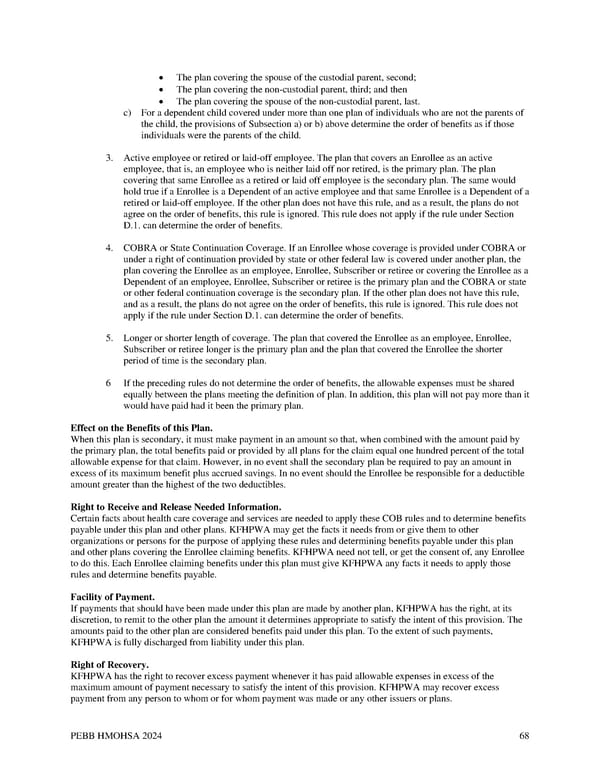• The plan covering the spouse of the custodial parent, second; • The plan covering the non-custodial parent, third; and then • The plan covering the spouse of the non-custodial parent, last. c) For a dependent child covered under more than one plan of individuals who are not the parents of the child, the provisions of Subsection a) or b) above determine the order of benefits as if those individuals were the parents of the child. 3. Active employee or retired or laid-off employee. The plan that covers an Enrollee as an active employee, that is, an employee who is neither laid off nor retired, is the primary plan. The plan covering that same Enrollee as a retired or laid off employee is the secondary plan. The same would hold true if a Enrollee is a Dependent of an active employee and that same Enrollee is a Dependent of a retired or laid-off employee. If the other plan does not have this rule, and as a result, the plans do not agree on the order of benefits, this rule is ignored. This rule does not apply if the rule under Section D.1. can determine the order of benefits. 4. COBRA or State Continuation Coverage. If an Enrollee whose coverage is provided under COBRA or under a right of continuation provided by state or other federal law is covered under another plan, the plan covering the Enrollee as an employee, Enrollee, Subscriber or retiree or covering the Enrollee as a Dependent of an employee, Enrollee, Subscriber or retiree is the primary plan and the COBRA or state or other federal continuation coverage is the secondary plan. If the other plan does not have this rule, and as a result, the plans do not agree on the order of benefits, this rule is ignored. This rule does not apply if the rule under Section D.1. can determine the order of benefits. 5. Longer or shorter length of coverage. The plan that covered the Enrollee as an employee, Enrollee, Subscriber or retiree longer is the primary plan and the plan that covered the Enrollee the shorter period of time is the secondary plan. 6 If the preceding rules do not determine the order of benefits, the allowable expenses must be shared equally between the plans meeting the definition of plan. In addition, this plan will not pay more than it would have paid had it been the primary plan. Effect on the Benefits of this Plan. When this plan is secondary, it must make payment in an amount so that, when combined with the amount paid by the primary plan, the total benefits paid or provided by all plans for the claim equal one hundred percent of the total allowable expense for that claim. However, in no event shall the secondary plan be required to pay an amount in excess of its maximum benefit plus accrued savings. In no event should the Enrollee be responsible for a deductible amount greater than the highest of the two deductibles. Right to Receive and Release Needed Information. Certain facts about health care coverage and services are needed to apply these COB rules and to determine benefits payable under this plan and other plans. KFHPWA may get the facts it needs from or give them to other organizations or persons for the purpose of applying these rules and determining benefits payable under this plan and other plans covering the Enrollee claiming benefits. KFHPWA need not tell, or get the consent of, any Enrollee to do this. Each Enrollee claiming benefits under this plan must give KFHPWA any facts it needs to apply those rules and determine benefits payable. Facility of Payment. If payments that should have been made under this plan are made by another plan, KFHPWA has the right, at its discretion, to remit to the other plan the amount it determines appropriate to satisfy the intent of this provision. The amounts paid to the other plan are considered benefits paid under this plan. To the extent of such payments, KFHPWA is fully discharged from liability under this plan. Right of Recovery. KFHPWA has the right to recover excess payment whenever it has paid allowable expenses in excess of the maximum amount of payment necessary to satisfy the intent of this provision. KFHPWA may recover excess payment from any person to whom or for whom payment was made or any other issuers or plans. PEBB HMOHSA 2024 68
 Kaiser Permanente WA CDHP EOC (2024) Page 67 Page 69
Kaiser Permanente WA CDHP EOC (2024) Page 67 Page 69